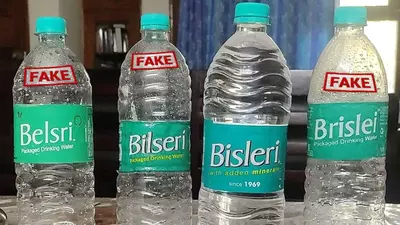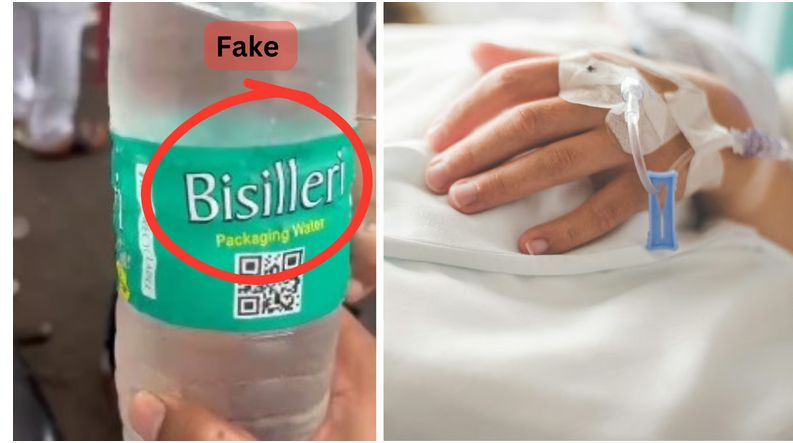
In a shocking revelation, authorities in Greater Noida have unearthed a fake water bottling racket operating under the guise of the renowned Bisleri brand. The factory, cleverly altering the name to “Bilseri,” was engaged in duping consumers with counterfeit products. This bust not only highlights the audacity of the culprits but also raises serious concerns about public health and brand integrity.
The Unfolding of the Scam
The illicit factory came under scrutiny following complaints from vigilant consumers who noticed discrepancies in the packaging of bottled water. Upon investigation, it was discovered that the miscreants had replaced the letters “S” and “L” in the name “Bisleri” to craft the misleading label “Bilseri.” This subtle alteration was intended to deceive unsuspecting buyers into believing they were purchasing genuine Bisleri products.
Acting swiftly on a tip-off, local law enforcement, in collaboration with food safety authorities, raided the premises of the factory. What they uncovered was startling: a fully operational facility equipped with machinery for bottling, labeling, and sealing counterfeit products. Hundreds of cartons of fake “Bilseri” water bottles were seized, along with packaging materials mimicking the original brand’s design.
Further investigations revealed that the operation had been ongoing for months, if not years, with a well-established distribution network. This network supplied counterfeit water bottles to local retailers and small shops, making it difficult for consumers to identify the fraud. Such systematic counterfeiting points to the necessity of enhanced monitoring and stricter regulations in the bottled water industry.
A Risk to Public Health
Counterfeit water products pose significant risks to consumer health. The water bottled in such factories often does not meet safety and hygiene standards, leading to the possibility of contamination. This incident serves as a stark reminder of the potential dangers of consuming unverified products, especially in regions where safe drinking water is already a critical issue.
Experts emphasize that such products can harbor harmful bacteria and chemicals, putting consumers at risk of severe illnesses. For unsuspecting buyers, the cleverly crafted packaging makes it nearly impossible to discern the fake from the original, further exacerbating the issue. Reports of illnesses linked to counterfeit bottled water are not uncommon, and this incident underscores the importance of stringent quality checks and consumer awareness.
Public health experts warn that contaminants in such water may include pathogens like E. coli and Salmonella, heavy metals, or even harmful industrial chemicals. These can lead to immediate illnesses such as diarrhea and food poisoning, as well as long-term health issues like kidney damage or developmental problems in children. The ramifications are particularly concerning in a country where access to clean drinking water remains a challenge for millions.
Legal and Corporate Response
In response to the bust, Bisleri International Pvt. Ltd. has reaffirmed its commitment to maintaining stringent quality controls and protecting its brand reputation. A spokesperson from the company expressed gratitude towards the authorities for their swift action and assured consumers that every effort is being made to eliminate counterfeit operations. They emphasized the importance of collaborative efforts between corporations and law enforcement to safeguard public health.
The culprits behind the “Bilseri” racket are now facing legal consequences. Charges under relevant sections of the Food Safety and Standards Act, along with trademark infringement laws, have been filed. This crackdown serves as a deterrent to others contemplating similar fraudulent activities. Legal experts suggest that such cases highlight the need for harsher penalties to dissuade future offenders.
Meanwhile, Bisleri has initiated a public awareness campaign to educate consumers about identifying genuine products. The company plans to introduce advanced anti-counterfeit features in its packaging, such as QR codes for authenticity verification. Such measures are part of a broader effort to restore consumer trust and ensure the integrity of their brand.
Why Brand Trust Matters
The Bisleri brand has long been synonymous with trust and quality in the bottled water industry. Counterfeiting not only tarnishes a brand’s reputation but also undermines consumer confidence. Such incidents highlight the need for robust measures to combat fraud and protect consumers from falling prey to substandard products.
Brands like Bisleri invest heavily in ensuring product safety and maintaining trust. Incidents like this underscore the importance of consumer vigilance and the role of authorities in safeguarding public interests. The rise of counterfeiting also raises questions about the responsibility of retailers and distributors in verifying the authenticity of the products they sell.
Brand trust is built over decades, and incidents like these can cause lasting damage if not addressed promptly. Companies must therefore adopt a multi-pronged approach to combat counterfeiting—including technological innovations, stringent supply chain audits, and proactive consumer education.
How to Identify Genuine Products

Consumers are encouraged to remain vigilant and check for signs of authenticity when purchasing bottled water. Here are some tips to ensure you’re buying the real deal:
- Inspect the Label: Look closely at the brand name, logo, and design for any irregularities.
- Check the Seal: Genuine products have tamper-proof seals that are difficult to replicate.
- Verify the Source: Purchase bottled water from reputable retailers and avoid dubious sources.
- Examine the Bottle Quality: Counterfeit products often use substandard plastic, which may feel flimsy or have an unusual odor.
While these measures can help, it is also incumbent upon companies to continuously innovate in their packaging and branding to stay ahead of counterfeiters. Consumers can also report suspicious products to the company or relevant authorities, contributing to the fight against fraud.
Broader Implications of the Bust
This incident in Greater Noida is not an isolated case but part of a larger issue of counterfeit products infiltrating markets. From food items to pharmaceuticals, counterfeiting poses a significant challenge globally. The economic impact is substantial, affecting legitimate businesses and costing billions in lost revenue annually.
More importantly, the health implications of consuming counterfeit products cannot be overstated. Governments, law enforcement agencies, and corporations must collaborate to address this menace effectively. Strengthening regulations, increasing penalties for offenders, and enhancing public awareness are critical steps in this direction.
The “Bilseri” bust also serves as a case study for the vulnerabilities in supply chain management. Experts advocate for the implementation of blockchain technology to create transparent, tamper-proof records of product origins and movements. Such innovations could revolutionize the way products are tracked, significantly reducing the scope for counterfeiting.
Strengthening Consumer Awareness
Public awareness campaigns play a crucial role in combating counterfeiting. Educational initiatives can empower consumers to make informed choices and recognize fraudulent products. Schools, community centers, and online platforms can serve as effective mediums for disseminating this information.
Social media, in particular, offers a powerful tool for spreading awareness quickly and effectively. Companies can use platforms like Instagram, Facebook, and Twitter to share tips on identifying genuine products and report counterfeit operations. Collaborating with influencers and content creators can further amplify these efforts, reaching a wider audience.
Conclusion: Vigilance is Key
The exposure of the fake “Bilseri” factory in Greater Noida is a wake-up call for all stakeholders—consumers, brands, and authorities alike. It highlights the critical need for awareness, stringent regulations, and prompt action to combat counterfeit operations. As consumers, we must remain alert and informed, while companies must continue to innovate and uphold their commitment to quality and trust.
With concerted efforts, such fraudulent activities can be curbed, ensuring that public health and brand integrity are preserved. The Greater Noida bust is a step in the right direction, but it’s only the beginning of a long battle against counterfeiting.
By addressing the root causes of counterfeiting and fostering a culture of transparency and accountability, we can create a safer marketplace for everyone. This incident serves as both a cautionary tale and a call to action, urging all stakeholders to play their part in eradicating this pervasive issue.

